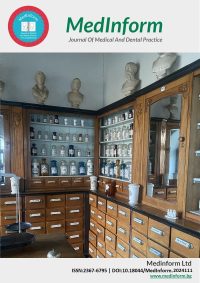Issue One 2024
2024, Vol. 11, issue 1, (January)
Original Article
A study of the cytotoxicity of resin-modified glass-ionomer cement
Abstract:
Background. It is crucial to maintain the vitality of the dental pulp by using biologically tolerable materials when placed on dentin near the dental pulp. Calcium-hydroxide cement has been established as such a material. Resin-modified Glass-ionomer cement (RMGIC) is another group of materials. The results on the biological tolerance of different types are contradictory.
Aim. Therefore, we conducted a study to compare the cytotoxicity of glass-ionomer cement available in powder and liquid packages with individual capsule doses on cell cultures.
Material and methods. The materials used in this study are zink phosphate cement AdhesorTM Fine (GR.1), resin-modified glass-ionomer cement Fiji LC II (Gr.2) powder-liquid package; Fiji LC II (Gr3) individual capsules package, calcium-hydroxide cement Basic L (Gr.4). The study was conducted on human skin-muscle embryonic fibroblasts (diploid cells) cell cultures.
Results. The study’s results indicate that RMGIC Fuji LC II and calcium-hydroxide cement studies have approximately the same degree of relative growth on cell cultures. However, in powder-liquid packaging, the results deteriorate over time, while individual ones retain their qualities.
Conclusions. The present study’s limitation is that RMGIC packages influenced the materials’ cytotoxicity degree. Individual capsules of RMGIC had a better degree of cytotoxicity close to the calcium-hydroxide cement. Further research is needed along these lines.
Keywords: Cytotoxicity, dental pulp, resin-modified glass-ionomer cement, individual doses

